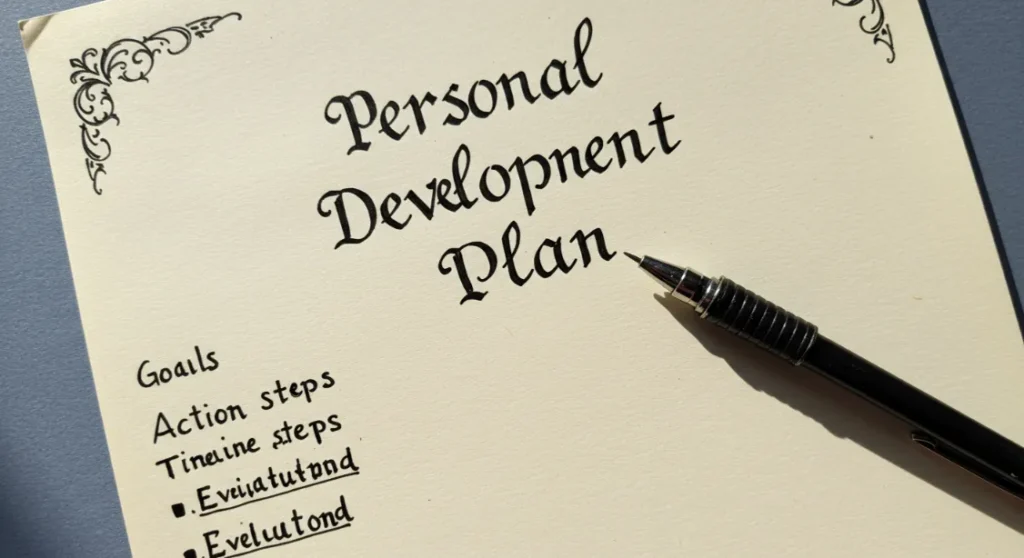Ever feel stuck watching opportunities pass you by? You’re not alone. The science of goal setting reveals that 92% of people fail to achieve their New Year’s resolutions. But here’s the good news—you’re about to discover how to break free from that statistic and transform your dreams into reality using proven scientific methods.
Setting goals isn’t just about writing down wishes. It’s a powerful psychological process that, when done correctly, rewires your brain for success. Research shows that people who use scientific goal-setting techniques are 42% more likely to achieve their objectives than those who don’t.
Key Takeaways:
- Writing down your goals increases your chances of success by 42%.
- SMART goals provide a clear roadmap for achievement.
- Visualization techniques activate the same brain regions as actual performance.
- Breaking big goals into smaller milestones makes them more manageable.
- Regular progress tracking and adjustments are crucial for long-term success.
- Celebrating small wins along the way boosts motivation and momentum.
The Psychology Behind Effective Goal Setting

Our brains are wired to respond to clear targets. When you set specific goals, your reticular activating system (RAS) begins filtering information differently, helping you notice opportunities you might otherwise miss. This neurological process explains why properly structured goals can dramatically increase your chances of success.
The Self-Determination Theory plays a crucial role in goal achievement. This framework suggests we’re most motivated when goals satisfy three core psychological needs:
Autonomy: Feeling ownership over your goals
Competence: Believing you can achieve them
Relatedness: Connecting goals to meaningful relationships
When your goals align with these needs, intrinsic motivation naturally follows. This internal drive proves far more powerful than external rewards for sustaining long-term effort.
SMART Goals: The Scientific Framework
The SMART framework transforms vague wishes into actionable plans. This evidence-based approach ensures your goals have the structure needed for success:
Specific: Define exactly what you want to accomplish
Measurable: Include concrete criteria to track progress
Achievable: Set challenging but realistic targets
Relevant: Align with your values and larger objectives
Time-bound: Establish clear deadlines
Research from the American Psychological Association confirms that goals following this framework significantly increase achievement rates. Rather than saying “I want to get in shape,” a SMART goal would be “I will run three times weekly for 30 minutes, building to a 5K in three months.”
Habit stacking can further enhance your goal achievement by connecting new behaviors to existing routines, making them easier to maintain.
The Neuroscience of Goal Achievement
Your brain physically changes when pursuing goals. Neuroplasticity—your brain’s ability to reorganize itself—means that consistent focus on goals creates stronger neural pathways. This explains why visualization for goals can be so effective; your brain doesn’t fully distinguish between vivid mental rehearsal and actual experience.
When you set and pursue goals, your brain releases dopamine—the “reward” neurotransmitter—creating a positive feedback loop that reinforces goal-directed behavior. This neurochemical response explains why breaking larger goals into smaller milestones can maintain motivation; each small win triggers this reward system.
Developing a growth mindset further supports this process by helping you view challenges as opportunities rather than threats.
Implementation Intentions: The If-Then Strategy
Implementation intentions use a simple “if-then” format to overcome common obstacles in goal pursuit. Rather than just setting a goal, you create specific plans for how you’ll respond to potential barriers:
“If situation X arises, then I will perform response Y.”
For example: “If I feel too tired to exercise after work, then I will put on my workout clothes immediately when I get home and do just 10 minutes.”
Studies show this technique can double or triple your chances of following through. Implementation intentions work by creating automatic behavioral responses that bypass willpower depletion.
Combining this approach with effective time management strategies can dramatically improve your follow-through rate.
The Power of Social Accountability

Publicly sharing your goals increases commitment. Research from the American Society of Training and Development found that people are 65% more likely to complete a goal after committing to someone else. The probability increases to 95% when they have specific accountability appointments with their partners.
This explains why accountability partners, mastermind groups, and public commitments are so effective. The social pressure activates our innate desire for consistency between our words and actions.
Creating a structured personal development plan that includes accountability measures can significantly boost your chances of success.
Overcoming Procrastination with Science
Procrastination often derails goal achievement. Research reveals this isn’t simply poor time management but an emotional regulation problem. We delay tasks that trigger negative emotions like anxiety, boredom, or frustration.
Effective strategies to combat procrastination include:
Temptation bundling: Pairing unpleasant tasks with activities you enjoy
The 5-minute rule: Committing to just five minutes of work to overcome initial resistance
Task segmentation: Breaking large goals into tiny, non-threatening steps
Developing mental clarity through practices like mindfulness can also help you recognize and manage the emotions that trigger procrastination.
The Role of Rest and Recovery
Quality sleep is a critical yet overlooked component of goal achievement. Sleep and goal achievement research shows that sleep deprivation impairs decision-making, weakens willpower, and reduces cognitive function—all crucial for successful goal pursuit.
Studies from Harvard Medical School demonstrate that sleep consolidates learning and enhances problem-solving abilities. This means proper rest actually accelerates progress toward your goals rather than delaying it.
Implementing good sleep hygiene practices and recognizing the connection between sleep and mental health can provide the foundation needed for consistent goal progress.
Leveraging Intrinsic Motivation

Goals driven by intrinsic motivation—doing something because it’s personally rewarding—are more likely to succeed than those driven by external rewards. Research by Edward Deci and Richard Ryan shows that connecting goals to your core values creates sustainable motivation.
To tap into intrinsic motivation:
Connect goals to your personal values and identity
Focus on mastery and improvement rather than outcomes
Cultivate autonomy by designing your own path to achievement
Learning to motivate yourself effectively is a skill that pays dividends across all areas of goal pursuit.
Measuring Progress Effectively
Peter Drucker’s famous quote, “What gets measured gets managed,” applies perfectly to goal setting. Tracking progress provides the feedback needed to adjust strategies and maintain motivation.
Effective measurement approaches include:
Leading indicators: Metrics that predict future success (daily actions)
Lagging indicators: Results that confirm progress (outcome measures)
Process goals: Focus on completing specific actions regardless of immediate results
Creating a self-improvement journal can help you track these metrics while providing valuable insights into your patterns and progress.
The Goal-Setting Feedback Loop
Successful goal achievement isn’t linear but cyclical. The scientific approach involves:
Set specific goals using SMART criteria
Take consistent action using implementation intentions
Measure progress with appropriate metrics
Reflect and adjust strategies based on results
Repeat with refined approach
This feedback loop, supported by conscious practice techniques, creates a powerful system for continuous improvement and goal achievement.
Conclusion: Your Science-Based Action Plan
The science of goal setting provides clear direction for turning dreams into reality:
Create SMART goals aligned with your intrinsic values
Develop implementation intentions for potential obstacles
Establish accountability systems with specific check-ins
Break large goals into small, dopamine-triggering milestones
Prioritize quality sleep and recovery
Track both process and outcome metrics
Regularly review and adjust your approach
By applying these evidence-based strategies, you’ll dramatically increase your chances of achieving even your most ambitious goals. The science is clear—success isn’t about willpower or luck, but about using proven methods that work with your brain’s natural tendencies rather than against them.
Remember that staying on track with goals is a skill that improves with practice. Each goal you set and achieve builds the neural pathways that make future success more likely. Your journey toward your dreams starts with that first, scientifically-structured step.
Resources:
- The Science of Goal Setting – Psychology Today
- Goal Setting and Action Planning – Positive Psychology
- The Neuroscience of Goals and Behavior Change – National Center for Biotechnology Information
- SMART Goals: A How to Guide – University of California
- The Power of Small Wins – Harvard Business Review
- Mindset: The New Psychology of Success by Carol S. Dweck—Book recommendation